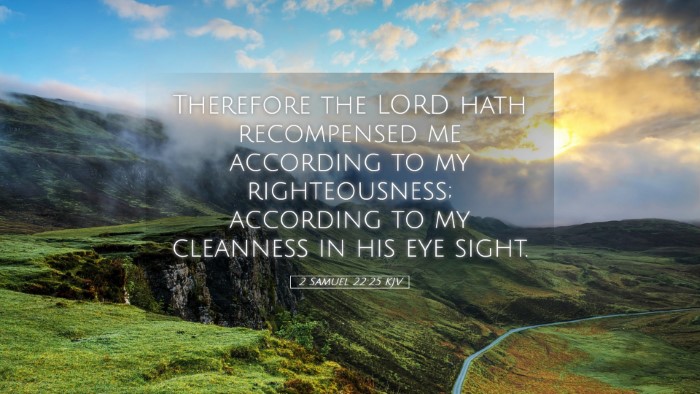Commentary on 2 Samuel 22:25
Verse Text: "Therefore the Lord hath recompensed me according to my righteousness; according to my cleanness in his eye."
Introduction
2 Samuel 22 is a rich text that serves as both a song of praise and a reflection on God’s deliverance in the life of David. This verse encapsulates a critical theme of divine justice and recompense based on the character and actions of the individual.
Contextual Overview
This chapter is framed as a personal psalm and poetic testimony of David's life, particularly celebrating God's intervention during times of distress. Here, David, proclaiming righteousness, highlights an essential theological principle—the balance of divine justice with human behavior.
Matthew Henry's Commentary
Matthew Henry, in his renowned commentary, emphasizes that David’s statement reflects his belief in moral accountability. Henry notes that David does not claim perfection, but rather a sincere cleanness as perceived by God. This notion of personal integrity resonated deeply within the Hebraic understanding of righteousness, portraying a life aligned with God's standards.
Key Takeaway: The divine recompense is not merely transactional but relational. Henry insists that God's judgments are deeply intertwined with our faithfulness and our responses to divine revelation. David’s confidence in God's justice affirms the idea that righteousness and purity in the eyes of God leads to divine favor.
Righteousness and Divine Recompense
- Understanding Righteousness: Righteousness in Scripture often refers to living in conformity to God's will. Henry directs us to consider how the righteousness being referenced must align with God’s commandments.
- Divine Justice: Henry points out that God's recompense, as illustrated by David, stresses that while grace undergirds the covenant relationship, justice remains a core attribute of God's nature. This reinforces the concept that while God extends mercy, He also honors righteousness.
Albert Barnes' Commentary
Albert Barnes offers a complementary perspective by emphasizing the nature of the "recompense" mentioned. He insists on the notion that God rewards according to one's character and deeds. This principle serves as a powerful motivation for ethical living amongst believers.
Spiritual Insight: Barnes denotes that the expression "according to my cleanness" reveals a deeper intimacy and understanding between David and God. He argues that David is not simply relying on works but on an authentic relationship birthed from faith and obedience. The emphasis lies in how the heart’s condition influences the relationship dynamic with God.
Implications for the Faithful
- Assurance in Faith: Barnes elaborates that this verse can provide believers with assurance in their service and walks with God. The understanding that God sees and remembers acts of righteousness can strengthen faith.
- Motive for Holiness: The acknowledgment that righteousness is rewarded serves both as a warning and a motivation for the faithful to pursue holiness in their daily lives.
Adam Clarke's Commentary
Clarke adds depth to the discussion with observations that guide readers into understanding the original Hebrew context. He explains the term "righteousness" as it implies not merely an ethical dimension but a relational one where covenant faithfulness is a large part of the equation.
Reflecting on David's circumstances, Clarke points out that during the psalm’s recitation, David is amidst challenges that reflect not only his immediate adversities but the ongoing tensions of leadership and fidelity to God amidst public and personal trials.
Clarke’s Exegesis
- Context of Suffering: Clarke underscores that David’s declaration came from experiences of suffering and adversity. Understanding this context enriches the interpretation of righteousness as not the absence of trouble but as fidelity in the face of it.
- Covenantal Framework: Clarke emphasizes the covenant context, suggesting that David’s claim of "cleanness" reflects a life that seeks to uphold God’s agreement with His people; thus making the statement both personal and communal.
Theological Reflection
The implications derived from 2 Samuel 22:25 resonate profoundly with the Christian doctrine of grace and works. The verse offers a seat at the table for discussions on how divine justice operates in the life of believers. It leads to essential reflections on:
- Faith and Works: How do we balance faith in Christ and the call to a righteous lifestyle?
- Mercy and Justice: What does it mean for God to be just, and how does this interact with His merciful character?
Conclusion
In pondering the profound truth of 2 Samuel 22:25, pastors, students, and scholars are reminded of the essential biblical model that intertwines righteousness, divine justice, and human responsibility. David's life serves as a testament that being in a right relationship with God produces a confidence that transcends tribulations and difficulties.
May this exploration of the text inspire both introspection and action, driving believers towards a deeper pursuit of holiness and an unwavering trust in God's righteous judgment.


